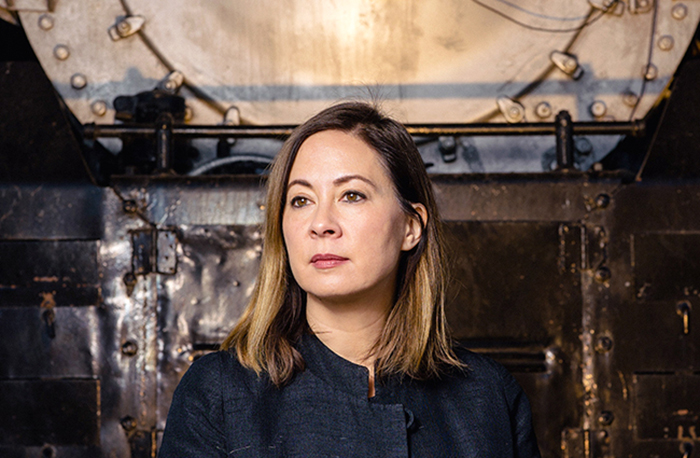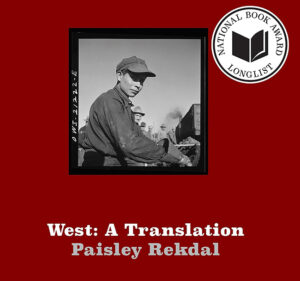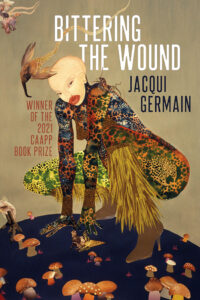CGU announces 2024 Tufts poetry Award winners

Jacqui Germain is the 2024 recipient of Claremont Graduate University’s Kate Tufts Discovery Award for her book, “Bittering the Wound,” a first-person retelling of the events in Ferguson, Missouri in 2014 following the fatal police shooting of 18-year-old Michael Brown. Photo/courtesy of CGU
By Tim Lynch | Special to the Courier
“Sorrowful news indeed has passed to me.
On what day will your wrapped body return?
Unable to close your eyes, to whom can you tell your story?
Had you known, you never would have made this journey.
Eternity contains the sorrow of a thousand bitter regrets.
Missing home, you face in vain Home-Facing Terrace,
Your ambitions, unfulfilled, buried under earth.
Yet I know death can’t turn your great heart to ashes.”
This elegy, written in Chinese characters and carved into a wall at the Angel Island Immigration Station in San Francisco by an anonymous detainee, is foundational to “West: A Translation” by Paisley Rekdal, the 2024 recipient of the Kingsley Tufts Poetry Award.
“West,” a collection of poems and essays, translates the elegy character by character through the lens of Chinese and other railroad workers’ histories, as well as through the railroad’s cultural impact on the United States. The Tufts judges found “West” both moving and educational.
Rekdal, a three-time finalist for the award, received news of her selection via a phone call from the judges — a Tufts tradition — a call she described as “a fantastic and career-defining moment.”
“The finalist announcement was made only a week before [the call], which — I have to say — makes the whole experience a lot less stressful. You’re still reeling from the delight of being a finalist,” said Rekdal, the former poet laureate of Utah and director of the American West Center at the University of Utah, where she also teaches.

Paisley Rekdal, the 2024 recipient of Claremont Graduate University’s Kingsley Tufts Poetry Award for her book, West: A Translation. Photo/courtesy of CGU
The award, one of the most lucrative in the field with a $100,000 prize, honors a book of poetry by someone in mid-career who already possesses an established body of work. Rekdal has written four books of nonfiction and seven collections of poetry. Her upcoming book, “Real Toads: Imaginary Gardens: How to Read and Teach a Poem,” offers insight into the art and craft of her trade.
“The real key to reading a poem is to go in rather like a forensic expert at a crime scene — gruesome, I know: Take note of all the things you see in the poem and spend time listening to and looking at its imagery and sounds without automatically trying to make meaning from them,” she said. “By slowly taking note of what you see, a narrative about how to read the poem will slowly emerge. Oftentimes, we think we have to get a poem instantly or we’re stupid. But great poems offer their reader multiple experiences, so re-reading isn’t a mark of our failure as readers, but our engagement as readers.”
Through a complementary website, westtrain.org, “West” offers multiple experiences that transcend the page. Visitors can experience the elegy in chronological order or at random by clicking on one of the 44 characters, each a thematic experience through video or poetry. It is a moving, intimate, and sometimes haunting history lesson told through words, images, and sound.
Rekdal knew she wanted to create a multimedia experience after being commissioned in 2018 to write a poem commemorating the 150th anniversary of the Transcontinental Railroad’s completion.
“The images I found were so powerful, and I thought that being able to use music, sound, and languages other than English would make the experience of that history more resonant,” she said. “I also liked the idea of creating a poem that students could access anywhere in the world and could play with … and make connections between events and themes that I can’t plan for.”
In short, “poets begin the work, but readers complete it,” observed Lori Anne Ferrell, director of the Kingsley and Kate Tufts Awards Program and dean of CGU’s School of Arts and Humanities. “A grand diversity of reception extends thought and feeling beyond the poet’s original conception. This is one of the many reasons why poetry is essential to an expression of shared human experience — offering joy as well as sorrow, resolution as well as suffering.”
The Kate Tufts Discovery Award, which carries a $10,000 prize and recognizes a first book by a poet of unusual promise, went to Jacqui Germain’s collection, “Bittering the Wound,” a first-person retelling of the events in Ferguson, Missouri in 2014 following the fatal police shooting of 18-year-old Michael Brown. “Bittering the Wounds” takes the reader through poems that depict a range of scenes — from mid-protest to post-protest — and personifies her hometown of St. Louis with a keen and loving eye. The book also takes occasional aim at the media’s portrayal of events.
The Tufts judges shared that they were astonished by Germain’s deft expressions of passion and control — not common in a first book. Germain also received the traditional cold call telling her the good news.
“I’m genuinely shocked, first, to even be included in such admirable and ambitious company as a finalist, and second, to have my collection selected for the award,” Germain said later. A published poet, journalist, and former labor organizer, she has received fellowships from the Economic Security Project, the St. Louis Regional Arts Commission, Jack Jones Literary Arts, Callaloo Creative Writing Workshop, and the Poetry Foundation’s Emerging Poets Incubator. In 2021-2022, she served as the Economic Security Project Fellow with Teen Vogue, reporting on issues of economic inequality at the intersections of race and gender.
Rekdal and Germain will be honored April 17 onstage at A Noise Within theater in Pasadena. This will be followed by a reading by both poets. This celebratory event will be open to the public.









0 Comments